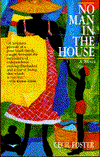No Man in the House
by Cecil Foster

Frigidly, February drags to a snowy end, and so too does this year's spirited celebration of Black History Month.
But many, like Barbados-born author, reporter and activist Cecil Foster wonder why the two must necessarily coincide. From his office in downtown Toronto , Foster questions the mechanism that has left the black community content with one month a year where its activities are illuminated, legitimized and therefore validated in the eyes of the rest of society.
"'For a month you can talk about Marcus Garvey, put on an anti-CoIumbus play or even show Malcolm X films -- whatever you want. At any other time, doing so may label you as subversive troublemakers or against multiculturalism."
As well, during the celebration Foster says there is an underlying sense emanating from outside the black community of "a month is all we can take, so gorge yourselves now -- and put up with the rest of the year."
Foster sees youth as the key to breaking this mold of blackness a la carte which unfortunately has become the mainstay of a very large community in need of cultural nourishment. In his 1991 novel No Man In The House (from which he'll read at tonight's Palmerston gig), now released in paperback by Random House, Foster elaborated on his theory of the potential of black youth.
Set in the poorest district on the island of Barbados , it is about an eight-year-old black boy being raised by his impoverished, warrior-like and indomitable grandmother. He comes under the direct tutelage of the reform-bent headmaster of his school, who is on the cusp of a powerful political ebb, the Democratic Front for Independence , which is mobilizing the citizens in a push to cut colonial ties with mother Britain .
An increase in the boy's self esteem comes to symbolize the island's future of independence, and failure to achieve it would result in a complete loss of hope. The book's message is that a greater world exists beyond the island, a lesson Foster says blacks feeling stuck in any environment should learn -- which requires more time than one, positive Black History Month.
And aside from just tapping into and co-opting black culture from past centuries, Foster issues a reminder that blacks come from a long legacy of survivors. He believes black youth are entering a new era of awareness, drawing parallels between Caribbean or African life and life in the urban centres of North America .
"Blacks need to adapt a new kind of thinking, become independent in thought, word and deed. We need to question our status, define our dreams and go after them. The luxury of sitting back and waiting for things to happen doesn't exist," he says.
"The notion of independence comes from trying to shape what is going to happen next. We can grab hold of the future by continuing to dream and investing in ourselves."
The black community must do this openly and continually, urges Foster -- not just when it is condoned as if merely to placate and diffuse murmurs of an uprising at ground zero. A constant and concerted push will break the cycle that has thus far contained the mobilization of an entire community to a short one-month period.
Showing great support for youth, Foster declares, "Given time, I'm confident that this is the part of our culture that will redeem us."
--sigcino moyo
original publication: NOW

